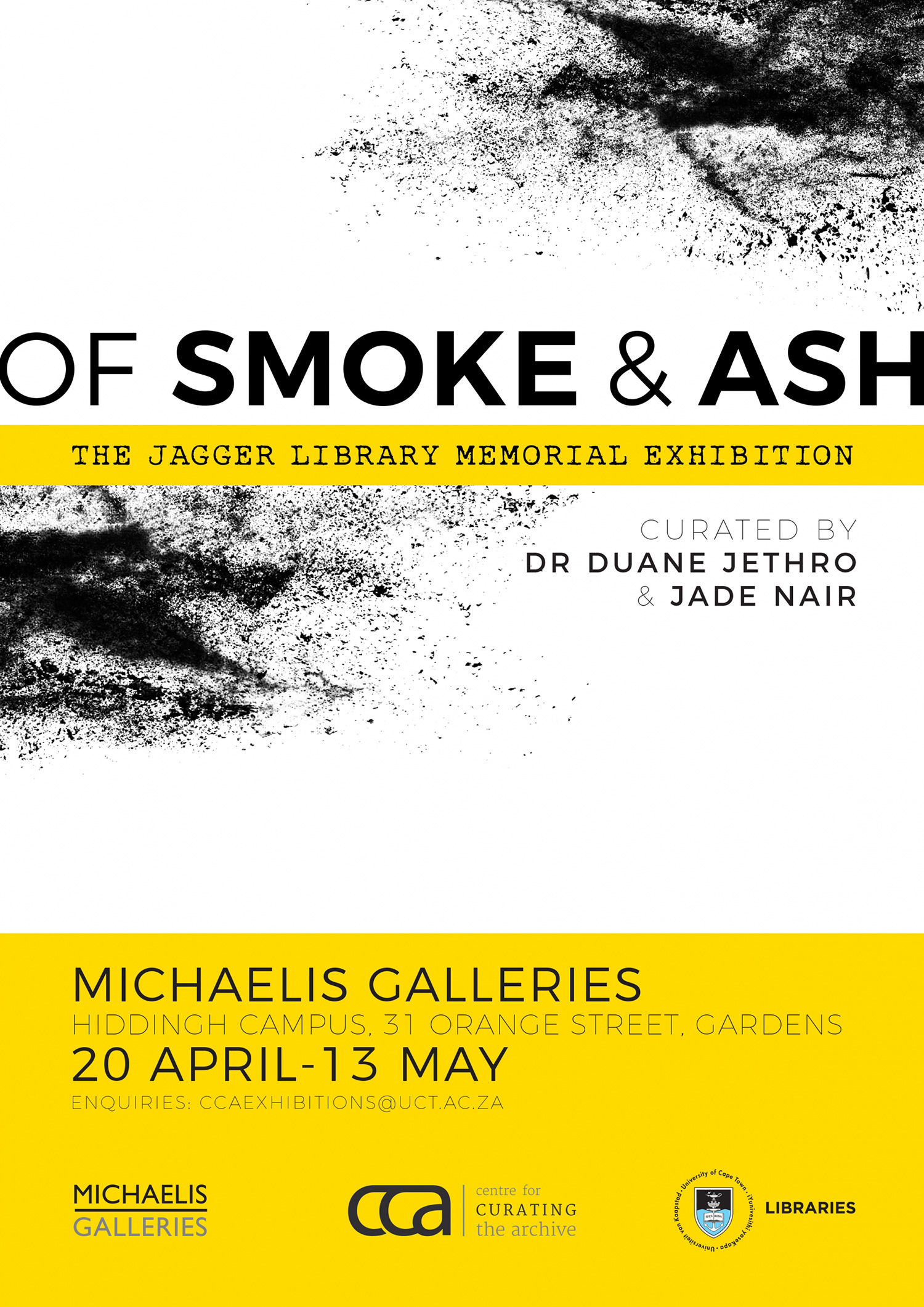Recognising the loss of the Jagger Reading Room
21 April 2021 | Professor Mamokgethi Phakeng
Dear colleagues and students
As many of you know the Jagger Reading Room was destroyed by the Table Mountain fire on Sunday, 18 April.
The JW Jagger Library (now the Jagger Reading Room) was named after a major benefactor of the University of Cape Town (UCT) Libraries in the early twentieth century. The building was constructed in the 1930s and served originally as the main library, then as a short loans centre and from 2000 to 2011 as the reading room of the African Studies Library. In 2011 the university began a restoration programme to restore the main hall of the Jagger Library to its original condition. This project was undertaken in two phases: first, the stripping away of walkways and balconies added in the 1960s and 1970s, and second, the painting, furnishing and restoration of original features.
UCT Libraries Special Collections comprises the African Studies Collection, Maps, Rare and Antiquarian books, Film and Video Collections, Newspapers, Journals and Magazines, Pamphlets and Ephemera, Manuscripts, and Photographs and Images. These collections are housed in the Jagger Reading Room and various other sites across UCT.
The Jagger Reading Room was home to the significant African Studies Collection, which was started in 1953. This collection of approximately 70 000 published monographs spanned the whole of sub-Saharan Africa and included national imprints from the entire continent as well as works published in Europe and North America. The collections were especially strong in gender studies, media studies, HIV/AIDS issues, and debates around the character of African studies as a discipline. There was an important collection on Southern African languages, donated to the university in the 1950s, which included religious texts and school textbooks as well as dictionaries and grammars. Some of the titles in these collections, published in the nineteenth and early twentieth centuries, were extremely rare.
Extent of destruction
The fire destroyed the Jagger Reading Room, gutting its roof and destroying the galleries, adjacent stores and offices. The team at UCT Libraries can confirm the archival and published print collections kept within the Reading Room were consumed by the flames. These include the vast majority of the African Studies Published Print Collection (approximately 70 000 items), the entire African Studies Film Collection on DVD (approximately 3 500), all the UCT university calendars, some of the heavily used Government Publications documents from South Africa and across the continent, and manuscripts and archives kept in the Reading Room for processing or digitisation or awaiting transfer after being digitised. A significant institutional loss is the original card catalogues for the Manuscripts and Archives repositories, the history of UCT Libraries, and the Special Collections Archive Office and administrative records.
While a mapping exercise has identified materials, a full assessment of this destruction can only happen once the building is declared safe and staff are permitted on site. A list will eventually be made available once donors and owners of collections entrusted to UCT Libraries are informed.
Residual damage
The libraries team anticipates residual damage due to the flooding of the building and possible seepage into the various spaces and two basement stores. These areas house part of the African Studies Collection; the Pamphlet Collections; the African Studies Poster Collection; Rare and Antiquarian Books; primary source materials, including the Manuscripts and Archives repository; the Modern Photography Prints; the All Things UCT Collection, which includes photographs, news clippings, periodicals and publications related to the history of the university; and the Architectural Collections, which includes most oversized architectural drawings. The team members will not know the full extent of the residual damage for a while.
I would like to acknowledge:
- the prompt and coordinated efforts of the various UCT Properties and Services teams with the Libraries Facilities team
- the City of Cape Town Fire and Rescue teams for all their efforts to control the fire and contain further damage to the Jagger Reading Room
- the outpouring of sorrow and commiseration, the messages of support and offers of assistance from both national entities and international institutions for crisis conservation and library disaster recovery efforts. UCT will certainly call upon them to be a part of this recovery process.
Sunday was a sad day for UCT and UCT Libraries. This loss will be felt deeply across our community as the libraries are so critical to all of us. We cannot replace the treasures of scholarship we have lost, but we can create new treasures out of our own scholarship. In the same way, each of us can rebuild our own sense of purpose out of this tragedy. Our colleagues in the libraries have a long road ahead of them and many of us feel the devastation of the loss of this significant institutional asset but we will walk this road to rebuild our facilities together.
Sincerely
Professor Mamokgethi Phakeng
Vice-Chancellor
Read previous communications:
 This work is licensed under a Creative Commons Attribution-NoDerivatives 4.0 International License.
This work is licensed under a Creative Commons Attribution-NoDerivatives 4.0 International License.
Please view the republishing articles page for more information.
#UCTFire – one year later
The Centre for Curating the Archive, in association with Michaelis Galleries (UCT) and UCT Libraries will stage a memorial exhibition marking the one-year anniversary of the tragic Jagger Library fire at the Michaelis Galleries. The exhibition will open to the public on Wednesday, 20 April 2022.
Campus communications
Updates on Campus Fire
Campus communications
News and videos
Memories of Jagger Library – stories from the UCT community
Content submitted by members of the UCT community has been published with little to no editorial intervention from UCT News.
#UCTFire – stories from the UCT community
Content submitted by members of the UCT community has been published with little to no editorial intervention from UCT News.
In an email to UCT students, Vice-Chancellor Professor Mamokgethi Phakeng said:
“Thank you for your patience as we seek ways to return to full academic activity at the University of Cape Town under COVID-19 regulations. Our first priority is to ensure the health and safety of everyone who needs to return to campus buildings.”
UCT is deeply grateful to all the donors who supplied food and other essential items for our students, and to everyone who has so generously offered other forms of support and assistance.
Everyone who would like to support the #UCTFire emergency relief fund is urged to please make financial donations to UCT through the UCT Alumni Ways to Give web page.
Donations can also be made by EFT using the details below:
Account name: UCT Donations Account
Bank: Standard Bank of South Africa
Branch code: Rondebosch Branch, 025009
Account number: 07 152 2387
Swift code: SBZAZAJJ
Please include your donor name if you so wish, as well as the reference for your donation, e.g. Name Surname, #UCTFire.
Messages of support





















































